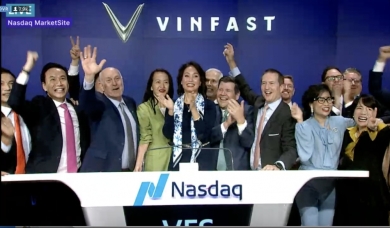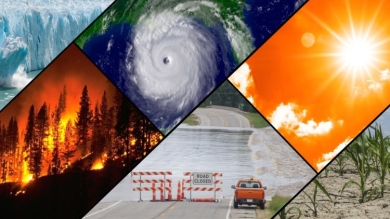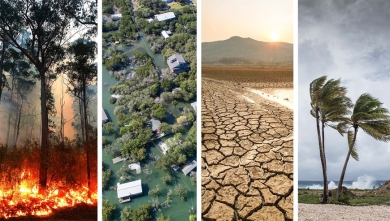A paradigm shift from globalization to planetary governance.
Globalization was about markets, information flows and technology crossing borders. The planetary is about borders crossing us, embedding and entangling human civilization in its habitat. That, in a nutshell, is the core thesis of a new paradigm-shifting book by Jonathan Blake and Nils Gilman titled “Children of a Modest Star: Planetary Thinking for the Age of Crises.”

Jonathan Zawada for Noema Magazine
The concept of planetarity describes a new condition in which humans recognize not only that we are not above and apart from “nature,” but that we are only beginning to understand the complexities of our interdependencies with planetary systems.
“If Copernicus’s heliocentrism represented the First Great Decentering, displacing the Earth from the center of the heavens, and Darwin’s theory of evolution by natural selection the Second Great Decentering, then the emergence of the concept of the Planetary represents the Third Great Decentering, and the one that hits closest to home, supplanting the figure of the human as the measure and master of all things,” Blake and Gilman write.
As further argued by the authors in a forthcoming Berggruen Press volume, “the Planetary as a scientific concept focuses on the Earth as an intricate web of ecosystems, with myriad layers of integration between various biogeochemical systems and living beings — both human and non-human. Drawing on earth system science and systems biology, this holistic understanding is being enabled by new planetary-scale technologies of perception – a rapidly maturing technosphere of sensors, networks, and supercomputers that collectively are rendering the planetary system increasingly visible, comprehensible and foreseeable. This recently-evolved smart exoskeleton — in essence a distributed sensory organ and cognitive layer — is fostering an unprecedented form of planetary sapience.”
The open question is how, and if, human governance in the late-stage Anthropocene can align with the knowledge we are now attaining.
Connectivity Is What Divides Us
Paradoxically, planetary-scale connectivity is also what divides us. Convergence entails divergence because the universalizing and rationalizing logic of technology and economics that ties the world together operates in a wholly different dimension than the ethos of politics and culture, rooted in emotion and ways of life cultivated among one’s own kind.
While the emergent world-spanning cognitive apparatus may be sprouting the synapses of a synchronized planetary intelligence, it clashes with the tribal ingathering of nations and civilizations that remain anchored in their historical and spatial identity.
Consequently, this new domain of encompassing awareness is — so far — as much the terrain of contestation as of common ground.
While grasping the new condition of planetarity may be a philosophical event that changes our way of seeing, it has not crossed the political and cultural threshold to the formation of a commensurate collective identity and the attendant legitimacy required for effective agency at the level it understands.
The primary contradiction as yet unreconciled is how to square the weighty centrifugal pull of tribalized identity with the centripetal imperative of binding planetary association.
Planetary Subsidiarity
Blake and Gilman address this conundrum through what they call “planetary subsidiarity” — a form of governance that seeks to accommodate both the diversity of plural jurisdictions and the necessity of joining together around common universal challenges.
In their multiscalar institutional approach, governance would be distributed, like natural systems themselves, reaching scale through networks, decentralized spatially in appropriate measure to the relevant action and empowered with authority at higher levels where necessary.
In essence, what can’t be handled at a lower level must be delegated to the next step up, while no higher authority should usurp what can be done at lower levels closer to the affected constituencies.
In practical terms, they thus envision, as is already emerging, “translocal networks” of cities and regions for everything from resource-efficient joint procurement policies to close coordination of climate or public health goals, not unlike military alliances such as NATO that seek seamless compatibility of force integration across nations.
Blake and Gilman also propose “planetary institutions for planetary issues.” As illustrative cases, they call for a “Planetary Atmospheric Steward” (PAS) and a “Planetary Pandemics Agency” (PPA).
PAS would conjoin with and enhance the U.N.’s Intergovernmental Panel on Climate Change’s function of increasing knowledge of the climate, including by utilizing AI’s data processing capacity and fostering new monitory technologies and sensors, availing all national, regional and local levels of governance of the information they’ve gathered to stand behind its “authority to make and enforce decisions on limiting carbon emissions on the basis of what it knows.”
The authors make this controversial point clear: “The PAS would have the authority to set hard targets for net greenhouse gas emissions — not suggestions or aspirations, but enforceable rules. The PAS’s decisions on greenhouse gas emissions won’t be optional: they will have to be obeyed and implemented by governance institutions at all scales. The principle of planetary subsidiarity guides the allocation of decision rights: the planetary institution sets the targets, national states decide how to handle the political-economic implications, and localities decide on the implementation details.”
Like the PAS, the PPA’s first task would be information gathering, not unlike today’s World Health Organization. It would “monitor human/animal and human/wilderness interfaces everywhere, including sites of deforestation and habitat destruction, the trade in wildlife, and industrial livestock, as well as regions with heavy antibiotic usage.”
A second role for the PPA is to act on its knowledge by making decisions to reduce the risks of disease emergence among humans by preventing the spillover of pathogens from animals and the evolution of new antibiotic-resistant microbes. This, in the author’s design, “requires the planetary institution to adopt a holistic perspective on human health, taking action to promote the health of animals, ecosystems and the biosphere as a whole. Only by taking action upstream of human infection can the PPA prevent epidemics from happening in the first place.”
The PPA’s third and most contentious role would involve centralized decision-making and coordination in the event of a pandemic or possible pandemic. The institution’s remit would include not only the ability to declare a “planetary public health emergency,” but also “the authority to set standards for national and local pandemic defense plans and to mandate when sub-planetary institutions should invoke these plans.”
Beyond all this, the PPA would take the lead in developing, producing and distributing vaccines and therapeutics for worldwide use.
The Question Of Legitimate Authority
Blake and Gilman readily acknowledge that their scheme follows a functional logic yet to find solid ground for the legitimacy it assigns to a higher sovereign authority beyond today’s nation-state. Their approach rests on the hope that if you can show a way, circumstances one day will generate the will.
My own take is that mobilizing such a will is only possible if the key sources of legitimacy — a shared worldview, general consent of the governed and accountability of delegated authority — are fulfilled.
The legitimacy for delegated authority at higher levels of governance, far from the innate pragmatism of face-to-face local interaction, can only be grounded in a shared worldview of publics at large. That is a tall order in today’s world where the very issues the authors use as illustrative cases — climate and pandemics — are among the matters of most passionate dissensus.
The first indispensable order of business, then, is to build what the Italian political thinker Antonio Gramsci called “ideological hegemony” — getting hearts and minds on the same page as the precondition for being able to institutionalize and exercise supra-state power legitimately. For Gramsci, it is the soft power of civil society consensus that legitimates the hard power of the state to act with force.
What political leaders such as Charles de Gaulle to thinkers like Yuval Harari have understood with respect to nations is no less true at the planetary level: It is the myth, guiding narrative or compelling story that makes a cohesive public, not the other way around. Intellectual endeavors to transform the way of seeing, such as this book, are for that reason of such primary importance.
Only under this condition of a common worldview can consent of the governed over broad policy goals be attained. And only on the basis of that consent — active or passive — can the power of enforcement be delegated indirectly to competent authorities who must remain accountable in some way to those who delegate that power.
Devolve, Involve, Decision-Division
In my 2013 book with Nicolas Berggruen, “Intelligent Governance for the 21st Century,” we grappled in the context of globalization and its rising discontents with the same set of multiscalar governing challenges raised by Blake and Gilman with respect to the planetary.
“The complexity of the deeper global integration of trade, investment, production and consumption, no less information flows,” we wrote, “requires a greater political and technical capacity at the megacity-region, national and supra-national level to manage the systemic links of interdependence. At the same time the growing diversity that has come with the global spread of wealth, amplified by social networks, requires more devolution of power toward the grass roots, where the restive public is clamoring from the bottom up for a say in the rules that govern their lives. Political awakenings everywhere are demanding the dignity of meaningful participation.”
The failure to find an institutional response to this double challenge, we argued, would result in a crisis of legitimacy for any system of governance.
Much as Blake and Gilman also see it, getting the balance right would entail devolving power and involving citizens in matters of their competence while fostering legitimacy and consent for delegated authority at higher levels of complexity. “Devolving, involving and decision-division,” other terms for the concept of subsidiarity, are the key elements of intelligent governance that can articulate a balanced relationship between what we called “knowledgeable democracy” and “accountable meritocracy.”
By knowledgeable democracy, we meant a public informed through institutionalized deliberation of policies. By accountable meritocracy, we meant nonpartisan technocrats who serve the agenda set by democratic deliberation and who must answer to it.
While Blake and Gilman focus on sovereignty rather than democracy, the basis of legitimacy for delegation of power in any governing system can only be found in accountability to the formation of consent within a common narrative.
Systems like China’s that rest governing legitimacy on performance must do so within the prevailing narrative the public has been sold on and bought into. What may be considered a mode of consent and systemic accountability exists as long as the goods are delivered within that parameter of expectations. If they are not, legitimacy withers. Preventing disruptive expectations from arising outside those parameters is why ideological control is always at the top of the Communist Party’s agenda — and why attempting to enforce an established narrative instead of adapting it to changed circumstances makes its authority so vulnerable.
An Analogue In American History
Although far different in scale from the planetary, there is an analogue from American history for how governance through subsidiarity might unfold.
At the turn from the 19th to the 20th century, America was morphing from an agricultural, largely rural society into an urban and industrial one. Cultural norms and familiar ways of living were in upheaval. Political institutions that had become dysfunctional were challenged — not so unlike the disruptive transition to digital society and planetarity we are experiencing at present.
The turmoil of transition in those days gave birth to what became known as the Progressive Era. Its progenitors sought to address the new social concerns of a more complex society — working hours and safety conditions in newfangled factories, women’s suffrage, public health exposure from mass food processing, poor urban infrastructure from housing to water and electricity, the concentration of power in the railroad and banking trusts as well as exploitative private utility companies.
The Progressive Era response in the American states was to move in two directions at once. The movement promoted direct democracy whereby citizens could make laws and enforce accountability directly, skirting the corrupt and bought-off legislators of the patronage machines, through the citizens’ ballot initiative, the referendum and the recall of elected officials. At the same time, elected Progressive governors delegated authority to nonpartisan experts for commissions that regulated commerce, banking, railroads and electric utilities on behalf of the public interest. Professional city managers, unelected but accountable to direct democracy and the elected officials who appointed them, came into being for the first time to competently administer ever more complex urban environments.
In time, the reforms that resulted from this pairing of citizen engagement and technocracy percolated up to the national level into institutions such as the Interstate Commerce Commission or the Food and Drug Administration and led to the abolition of child labor, the eight-hour working day and women’s right to vote.
The point of this brief detour into American history is not to suggest the unworkable proposition of direct democracy at a planetary scale, but simply to say that it is well within the capacity of the political imagination to marry modes of consent with delegated authority in a way that confers legitimacy.
The paradigm shift and governing innovations Blake and Gilman propose in “Children of a Modest Star” are no less realizable over time than what has come before because, now just as then, changing circumstances demand it.
The rigorously thought-through case of “Children of a Modest Star” is a signal contribution toward building a shared worldview necessary to take the next steps. On the cutting edge of new thinking, Blake and Gilman have moved the needle forward by imaginatively addressing the perennial issues of governance within the new planetary condition we all now inhabit.
BY NATHAN GARDELS - NoemaMag









